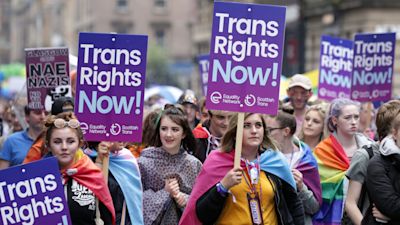Scotland's gender recognition Bill clears first stage prompting minister to quit

Ellie came out as transgender when she was 18 - the most tedious part of the process was the admin, she tells Scotland Reporter Louise Scott
A piece of gender legislation brought forward by the Scottish government has cleared its first parliamentary hurdle.
Just hours before the Gender Recognition Reform Bill was voted on by Scotland's lawmakers, community safety minister Ash Regan resigned, saying her “conscience” would not allow her to vote with the Scottish government.
Additionally, seven Scottish National Party MSPs defied the whip - an instruction compelling members to vote in a particular way - in order to vote against the bill.
The Bill passed stage one of the parliamentary process with 88 votes in favour, 33 against and four abstentions.
What will the Gender Recognition Reform Bill change?
The Bill will remove the requirement, currently in place across England, Wales and Northern Ireland, for a medical diagnosis of gender dysphoria when seeking a gender recognition certificate.
It will also reduce the length of time an applicant must live in their acquired gender from two years to three months, with an additional three-month reflection period. Additionally, the minimum age for applying will be reduced from 18 to 16.
Why is the bill controversial?
Some MSPs and women’s groups have raised concerns that the change in the law could put women and girls’ rights at risk.
They claim that predatory men could abuse the gender recognition system in order to enter single sex spaces, such as women's refuges.
In support of a protest against the Bill earlier this month, Harry Potter author JK Rowling tweeted a picture of herself wearing a T-shirt branding Nicola Sturgeon a “destroyer of women’s rights”.
However, social justice secretary Shona Robison defended the bill, calling the current system "intrusive, medicalised and bureaucratic".
“The Bill aims to simplify and improve the process for a trans person to gain legal recognition, giving them better access to their existing rights,” she said.
“Our support for trans rights does not conflict with our continued strong commitment to uphold the rights and protections that women and girls currently have under the 2010 Equality Act."
The seven MSPs that voted against the Bill were: Stephanie Callaghan, Fergus Ewing, Kenneth Gibson, Ruth Maguire, John Mason, Michelle Thomson and Ms Regan.
Two SNP MSPs - Annabelle Ewing and Jim Fairlie- abstained.
Want a quick and expert briefing on the biggest news stories? Listen to our latest podcasts to find out What You Need To Know
Why did the community safety minister quit ahead of the vote?
In a letter to the first minister, community safety minister Ash Regan said: “I have considered the issue of gender recognition reform very carefully over some time. “I have concluded that my conscience will not allow me to vote with the government at the stage one of the Bill this afternoon."
In a terse response, Ms Sturgeon said “at no stage have you approached me… to raise your concerns.”
Responding to Ms Regan’s resignation, the first minister said: “As you are aware, a key requirement of the ministerial code is collective responsibility – a principle essential to effective governance, and which applies across all matters of government policy irrespective of the issue. “I note that at no stage have you approached me – or indeed the Cabinet Secretary for Social Justice – to raise your concerns about the Gender Recognition Reform Bill or the vote this evening."
What happens next?
In stage two of the process, MSPs will propose changes, or amendments, to the Bill.
There will be another debate and vote on whether or not to pass the updated Bill.
If the Bill is not passed, it falls and can’t become law.